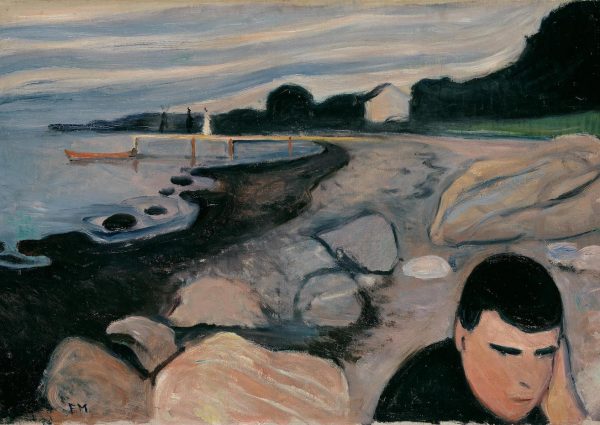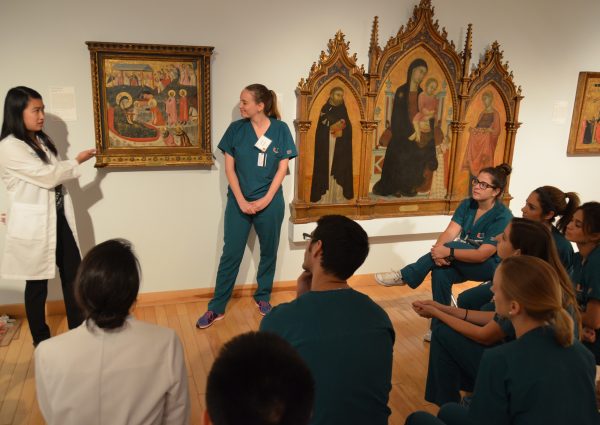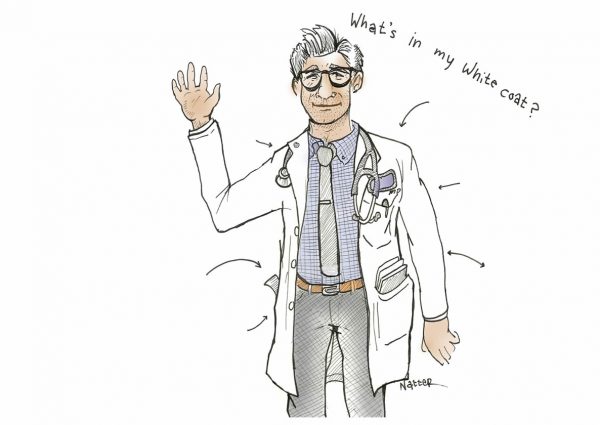Commentary by Tony Miksanek, M.D., family physician, short-story author, and coeditor, Literature, Arts, and Medicine Database
As a profession, physicians are a remarkable group of writers. What doctors lack in good penmanship is more than compensated for by their skill in penning stories and poems. Their literary accomplishments are even more impressive given a lack of formal training in the art of writing. Only a few physician-authors have MFA degrees. Most medical students do not major in English or literature while in college. Doctors become talented writers the old-fashioned way. They practice. They also teach themselves via voracious reading with attention to style and technique. They occasionally attend writing workshops.
It helps that doctors are immersed in stories. If the business of medicine is taking care of patients, then the currency used in the transaction are the narratives of illness told by patients and received by physicians. Doctors spend a good chunk of their professional lives listening to stories. It’s only natural that doctors would retell versions of these tales or craft their own new ones. All the elements of a story are readily available to any doctor: plot, protagonist, antagonist, setting, dialogue, and theme. Physicians witness struggle – disease, death, and suffering – all the time. Writers call it conflict. Physicians regularly observe cures, acts of heroism, and even miracles. Writers refer to it as denouement. Doctor-writers have oodles of experience to tap from. They have a rich pipeline of poignant images, unforgettable language, colorful characters, and vexing irony in any single day. In addition, physicians get plenty of practice writing and editing office notes, consultations, and histories & physicals.
There is an elite roster of physician-writers for readers to drool over. Anton Chekhov, John Keats, Arthur Conan Doyle, William Carlos Williams, A.J. Cronin, W. Somerset Maugham, and Mikhail Bulgakov are a few names that immediately come to mind. There are also many recognizable physician-writers including Michael Crichton, Robin Cook, and Frank Slaughter who may not get the love (critical acclaim) but certainly get the money (commercial success). There is a sizeable but unquantifiable group of practicing physicians who engage in creative writing without fanfare. These doctors take their writing seriously whether they consider it a hobby, diversion, or passion. I estimate that as many as 4-7 percent of all practicing physicians in the United States are currently working on a poem, story, or novel.
With hectic, unpredictable, and stressful jobs, why do doctors want to write? Given the demands and responsibilities associated with a career in medicine, why do so many physicians make time to write? The short answer is that doctors write for many of the same reasons that non-physicians do: They feel compelled to write. They have something to say. They love words and language. They are excited by the process and gratified by the result. They are inspired.
Here are seven special reasons (ranked from most important to least important) why doctors write:
1. Therapy – Physician heal thyself. Nothing promotes healing like writing a poem or short story or even a single glorious sentence. Writing helps a doctor get things off their chest in a much more productive way than yelling at a nurse, ranting at a patient, or being grouchy at home. Poems and stories written as a form of therapy are easy to spot. They have a confessional quality.
2. Exploration – Doctoring is hard. Creative writing is an opportunity for physicians to make sense of what they do. Stories written for the purpose of searching sometimes have themes that focus on medical ethics and boundary issues.
3. Sharing – Doctors can pass along knowledge and experience by writing in clever and vivid ways. Humor and compassion provoke memorable moments in literature. A perfect example is The House of God by Samuel Shem.
4. Joy – Writing is fun. Okay, maybe not always – rewrites, editing, and the evil “writers’ block.” At some level (the spark that begins the project or reading the finished manuscript), there is euphoria. Would you settle for glee?
5. Honor – Writing allows physicians an opportunity to memorialize patients and colleagues. These literary works feature a fictionalized version of a character or an amalgamation of a few people. Creative writing can immortalize someone. P.S.: Doctor-narrators also reap literary longevity.
6. Atonement – Doctors make mistakes. They sometimes behave badly. They have regrets. Stories and poems can be part of their penance. Think “Brute” by Richard Selzer.
7. Notoriety – Let’s not lie to ourselves. Who among us would not want to be a rich and famous author? I don’t know any doctors who would turn down a Pulitzer Prize, National Book Award, or an appearance on The Oprah Winfrey Show. Good luck with that.









American Journal of Medicine
Interesting blog. We have added a link to your blog on the American Journal of Medicine blog.
Pamela J. Powers, MPH
Managing Editor
Pamela J. Powers
I am new to your blog. I was curious if you have reviewed physician and patient blogs from the standpoint of medical humanities.
Having been in health care and medical communication for more than 20 years, I find these blogs informative, compelling, heart-warming, and often humorous. One physician blogger even wrote a post about the most interesting Twitter comments by other doctors. These were fascinating, to-the-minute stories about the lives of doctors, as their lives were unfolding.
In my humble opinion, this is the future of medical humanities.
Pamela J. Powers
Managing Editor
American Journal of Medicine
Ryan DuBosar
There’s also Khaled Hosseini, who was an internist while writing The Kite Runner and now A Thousand Splended Suns.
Felice Aull
Yes, and there are many more physician writers–230 in the Literature, Arts, and Medicine Database, where you can do a People Search for physician authors.
Rob
Is it because doctors are such avid readers that many of them write so well? Like Ryan, I too, thought of the Kite Runner author when I read this article. Thanks for the thoughtful commentary.
Mark
Other noteworthy European physicians include Francois Rabelais, Frederich von Schiller, and Erasmus Darwin, father of Charles and poet. An American physican/writer, Benjamin Spock, takes the blame for many of my individual quirks and failings, at least in the eyes of my mother.
Sol
It’s also definitely a matter of class. Doctors are a class of people, a professional elite. While they have a hectic job, full of stress and unpredictable schedules, they are also economically stable, relatively speaking. Their concerns should be elevated to their job’s socioeconomic status: doctors must take up the humanities as an art, they must see human beings as more than numbers, and at the same time, they must see people as more than simply obstacles, enemies, friends, or types.
With this elevated perspective, it’s likely to lose perspective, too. A stressful environment of long hours, a work requiring years of training and more and more specialization–these things, too can cramp ones ability to truly listen, observe, and communicate the human experience. Which is an artists task. A human task. A difficult task, whichever way you look at it.
Thomas Lawrence Long
Sol’s observation has me thinking about why more nurses have not been celebrated as physician writers have. As a professor of English appointed to a school of nursing, I see medical professionals here in similar circumstances to those of physicians. I wonder if Sol’s observations about “class” (social, economic, professional) are the key. Nursing has often drawn people from working class backgrounds; nursing education includes people with associate degrees without a broader liberal arts background. However, there are powerful stories in nursing as well. Interestingly, since creating a blog to support nursing scholars (NursingWriting.Wordpress.com), I have noted that the third most frequently read posting is one for the Canadian journal, Ars Medica. So there are nurses out there interested in creative writing!
–Tom Long, School of Nursing, University of Connecticut
Cortney Davis
An excellent article by Tony Miksanek and interesting comments! But how sad that the work of so many excellent and celebrated nurse writers and poets seems to be flying under the radar. Tom (from UCONN’s School of Nursing), you will be pleased to know that many nurses, from a variety of social circumstances, are well-published writers whose work is available to use as texts, for discussion groups and for personal contemplation. There are many nurse writers but, alas, the nursing profession has not embraced literature and nursing as the medical profession has embraced literature and medicine. Nurses write for many of the same reasons that doctors write, although I might rearrange the list, giving priority to “honor.” Nurses honor their patients and the private time they spend with them–often at the most critical moments of life–through writing. Nurses rarely write with an eye to fame. I think that perhaps nurses often write from a “spilling over,” both of joy and sorrow. Nurses share the imtimacy of the patient’s illness and body in a unique way; although the circumstances of nurses’ stories may be similar to those of physicians’ stories, in many ways they are different. Taken together, the writing of both nurses and physicians illuminate in a more complete way the interaction of patients and caregivers. May I suggest just a few names, of the many possibilites, that you might either Google or look up on Amazon to find a wealth of writing by nurses? My apologies to the many nurse writers I have left out, but I have tried to concentrate on those writers who have one or more literary books available for use: Madeleine Mysko, Veneta Masson, Judy Schaefer, Paula Sergi, Sandra Ebner, Belle Waring, Ted Deppe, Constance Studer, Jeanne Bryner, Muriel Murch, Jeanne Beall, Janet Bernichon, Celia Brown, Amy Haddad, Jeanne LeVasseur, Dana Shuster, and myself, Cortney Davis.